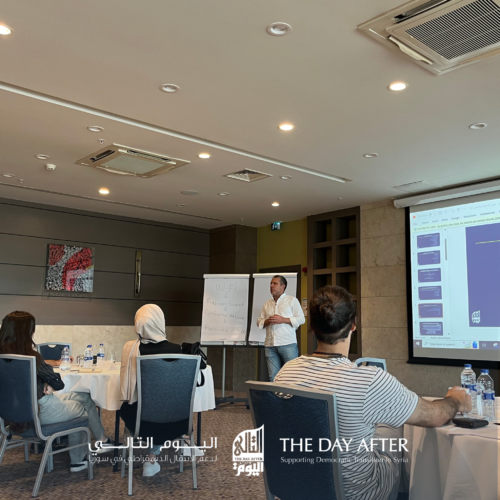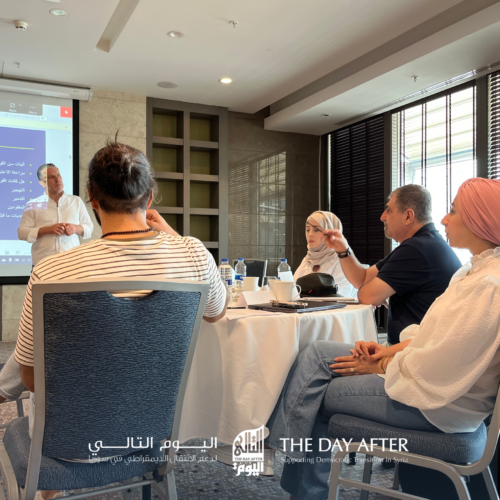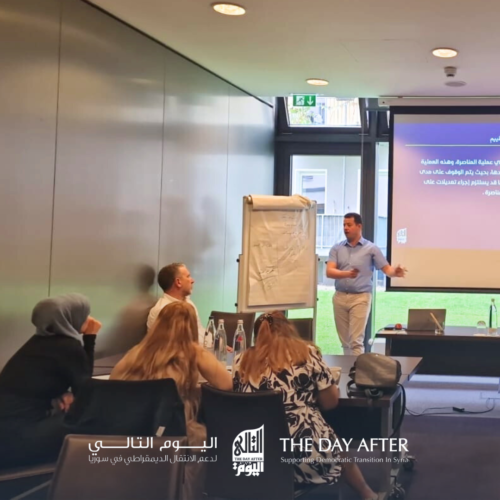Over the course of the period spanning June to September 2023, The Day After undertook a series of comprehensive training initiatives to bolster justice and human rights efforts in Syria. Among these endeavors, the organization successfully executed a program designed to enhance awareness and understanding of housing and property rights, a crucial aspect of human rights in the Syrian context.
This program was structured to benefit a group of aspiring young Syrian individuals who are actively engaged in human rights advocacy and civil society activism. The primary goal was to equip them with a profound comprehension of the intricate landscape of housing, land, and property (HLP) rights in Syria, both pre-conflict and throughout the ongoing crisis.
The training, which drew the participation of approximately 55 young Syrian men and women, unfolded over an intensive duration of 52 training hours during the specified timeframe. To ensure comprehensive coverage and accessibility, the trainees were systematically divided into distinct phases based on their respective locations, encompassing participants within Syria, Turkey, and Europe.

-
Phase I (Online):
Commencing with a foundational conceptual approach, this phase delved into the essence of property and housing rights. Topics encompassed property rights as documented in international treaties and related concepts.
-
Phase II (Online)
: This phase expanded upon engineering and administrative notions, including an in-depth exploration of administrative divisions within Syria and the distribution of the population across Syrian governorates. Practical experiences, coupled with a focus on the engineering concepts and tools employed in crafting organizational structures, were integral elements.
-
Phase III (Online)
: The third phase directed attention toward the impact of housing and property rights during conflicts. By delving into international experiences within this sphere, the goal was to discern successful models and glean insights from less effective ones.
-
Phase IV (Hybrid):
In this concluding phase, in-person sessions were conducted for trainees based in Turkey and Europe, while online sessions continued for Syrian participants. This phase comprehensively addressed various violations that adversely affect property rights. Practical exercises served to illuminate the repercussions of property rights violations on other fundamental rights, exploring the legal avenues to address these issues and the importance of property rights in the broader peacebuilding process.
|
Why is The Day After interested in HLP training? The issue of property rights and housing is very complex, as violations in this context extend to the pre-revolution period, and it is also linked to many other issues, including the return of displaced refugees, demographic change, women’s rights, and transitional justice issues. Engineer Ahmed Taha, the HLP Project Director mat TDA, said: “Over the years of our work on this issue, we noticed, firstly, the small number of experts and those interested in this type of rights, and secondly, the scarcity of young men and women who care about these issues. Therefore, a group of young men and women was targeted. To train them and transfer experiences from generation to generation. The Next Day also works to enhance interest and increase experience and awareness of the issue of property rights for several reasons, including what is related to “the interconnected nature of human rights that imposes on us not to care about some of them over others, human rights over others,” according to Judge Anwar Majnni. Property and housing rights are linked to a number of rights, including the right for people to return to their homes, given that the desire to return is linked to the existence of these homes, and is also linked to political rights such as the right to vote, and transitional justice, especially with regard to mechanisms for reforming institutions and redressing harm. All TDA’s issues on HLP are available via the link
|
|---|


